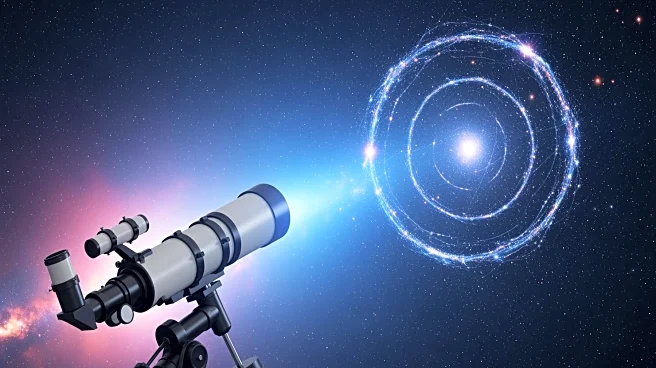What's Happening?
A recent study led by Rajendra Gupta, an Adjunct Professor in the Department of Physics at the University of Ottawa, proposes a groundbreaking model that challenges the long-held belief in dark matter and dark energy. The research suggests that the effects
attributed to these mysterious components could be explained by the gradual weakening of the universe's fundamental forces over time and space. This model introduces a parameter known as α, which emerges when the coupling constants, describing the strength of fundamental forces, are allowed to evolve. This α term acts as an additional element in gravitational equations, replicating the effects traditionally explained by dark matter and dark energy. The study, titled 'Testing CCC+TL Cosmology with Galaxy Rotation Curves,' appears in the peer-reviewed journal Galaxies.
Why It's Important?
This research could significantly alter the scientific community's understanding of the universe. If the model proposed by Gupta is validated, it could eliminate the need for dark matter and dark energy in explaining cosmic phenomena, potentially saving billions of dollars spent on searching for dark matter particles. The model provides a unified framework for explaining observations like galaxy rotation and clustering without invoking unseen dark matter halos. This could lead to a paradigm shift in cosmology, affecting theories about the universe's formation and evolution. The implications extend to astrophysics and cosmology, where the existence of dark matter has been a cornerstone for decades.
What's Next?
The next steps involve further testing and validation of Gupta's model through observational data and simulations. If the model holds up under scrutiny, it could lead to a reevaluation of current cosmological theories and models. The scientific community may need to explore new avenues of research to understand the universe's fundamental forces and their evolution. This could also impact funding and focus areas in astrophysics research, as resources may shift away from dark matter searches to exploring the implications of evolving constants of nature.
Beyond the Headlines
The ethical and philosophical implications of this research are profound. It challenges the scientific community to reconsider the nature of the universe and the assumptions underlying current cosmological models. The idea that the universe's biggest secrets might be 'tricks' played by evolving constants invites a reevaluation of how scientific knowledge is constructed and validated. This could lead to broader discussions about the nature of scientific inquiry and the role of theoretical models in understanding the cosmos.


















